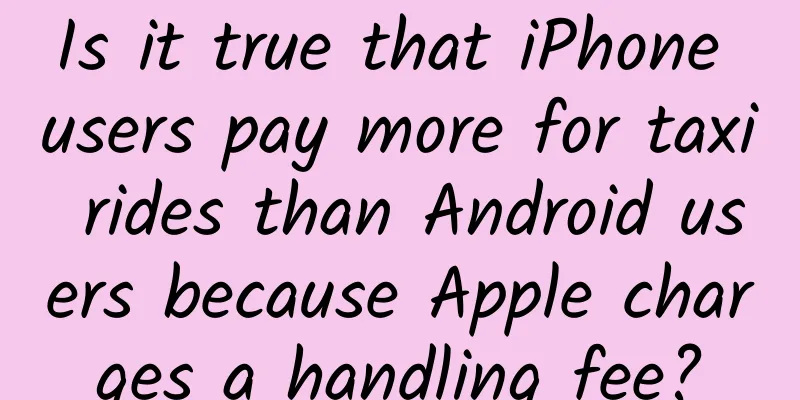Is it true that iPhone users pay more for taxi rides than Android users because Apple charges a handling fee?

|
Recently, a Weibo user questioned the price discrimination of the same service on iPhone and Android, which triggered a round of discussion on Apple's revenue sharing. You consume digital applications and services every day, but you don't understand where the money you pay for the applications eventually goes.
A controversial Weibo post Not all purchases on the iPhone are divided into The crux of the controversy on this microblog is that the blogger confused App Store payment with third-party payment, mistakenly thinking that Didi Taxi's taxi fares were collected by Apple and thus had to be shared, and guessed that Didi Taxi passed this part of the fee on to consumers, resulting in excessively high taxi fares. In fact, Didi Taxi's taxi fares are paid by third-party payment, and Apple also made it clear that third-party payment does not belong to in-app purchases, so there will be no revenue sharing. As for why my colleague's taxi fares are higher than mine, there may be other reasons. In addition to the third-party payment that we use almost every day, Apple also does not participate in the revenue sharing of the following:
There is a simple rule that can be used to determine whether purchases made on an iPhone will not be divided by Apple, and that is whether the funds pass through Apple's hands. If it is an "in-app purchase" defined by Apple, the application will call the App Store purchase interface when making payment, and Apple will participate in the sharing of all these consumption. App Store purchase interface Not all share ratios are 30% As a platform content distributor, the App Store will charge developers a certain percentage of revenue for each purchase to make up for the labor costs and hardware investment of the App Store operations. Until the 2016 WWDC Developer Conference, the ratio remained at 3:7, meaning Apple took 30% of the revenue and developers received 70%. At WWDC 2016, Apple readjusted the App Store revenue sharing rules:
(The above ratios do not take into account transaction taxes.) App Store profit margin rules Who will bear the cost of the commission? As mentioned earlier, building an App Store actually requires a lot of development and operating costs, and also the cost of App Store download traffic. From Apple's perspective, they chose to charge a certain share. But from the developer's perspective, 30% of the fee is indeed not low. Developers also have different opinions on who should bear this fee. Some content or service providers have covered Apple's share of the fees themselves, which means that whether purchased on an iPhone, Android platform, or even on the web version, the prices of these content or services are roughly the same. For example, Weibo memberships and QQ Music Green Diamonds are basically the same on several platforms. The pricing of Weibo membership and QQ Music Green Diamond on various platforms Zhihu also treats the web version, iOS users and Android users equally in terms of paid content and books. However, there is an additional concept of "Zhihu Coin" on the iOS side. The reason is that the price of in-app purchases in the App Store cannot be freely priced, but has a fixed level. Therefore, recharges on iOS are all done at a fixed amount, but one Zhihu Coin corresponds to one RMB, and there is no reduction. Fixed-level "Zhihu Coin" Other developers handle it completely differently. They choose to pass this cost on to users and charge higher fees on the iOS platform. However, these services are universal on multiple platforms, so for consumers, we can purchase services on low-priced platforms other than the App Store, and then enjoy paid services on iOS. For example, the domestic video service iQiyi has differentiated pricing between the web, iOS, and Android versions. The purchase price of the iOS version is obviously much higher than that of the web and Android versions. iQIYI membership pricing on various platforms summary Back to the controversial Weibo post itself, it was actually a misunderstanding caused by the user's lack of understanding of the App Store's profit-sharing rules. As an independently operated public company, Apple does have the right to freely determine the profit-sharing ratio, but whether the profit-sharing ratio is reasonable is another question. In addition, when we consume on e-commerce platforms, taxi-hailing platforms, etc., we may encounter that our fees are higher than before or higher than others, which does not rule out the possibility of "big data killing old customers". Merchants use data analysis to determine that you are an old user or a user with higher income, and then automatically charge you higher fees. What other examples of differential pricing have you seen? Discuss with us in the comments. |
<<: How Big Data Analytics Can Create Better Mobile App User Experiences
>>: WOT + Heroes Gathering, a feast that technical people cannot miss in 2018
Recommend
Growth hacking in action: a complete case study to explain the core operation methods
The concept of growth hacking has been very popul...
Chinese Internet celebrities who are popular on YouTube
"Li Ziqi is super popular in Korea!" A ...
The most comprehensive guide to promoting good products on Zhihu
There is a very good question on Zhihu: Why do or...
APP operation: Can the revenue from application push be increased by 400%?
Push is the most cost-effective and direct market...
Dissecting the cases of brands that became popular on Xiaohongshu!
The epidemic situation in Shanghai has been sever...
Today's headlines traffic diversion skills and advantages
A bird of prey, eating large chunks of meat. I ha...
Mobile APP and game promotion, why can’t we achieve significant results even though we have a budget?
Many people may not understand that in operations...
Experts complain about iOS 11: Data is not safe
ElcomSoft, a Russian company, said that now that ...
How did they achieve 1,500 orders per day, 30 yuan per customer, and a cumulative turnover of 20 million?
Isn’t it that product sales have encountered a bo...
What I did after taking over a negative iOS project
Half a year ago, I joined a startup team that had...
Research on 100 growth closed loops | Missionbao fission to increase followers of public accounts
How can we successfully increase the number of fo...
Based on 800 million massive data, here are 5 tips to increase the click-through rate of news messages
The China Internet Network Information Center (CN...
The whole process of an Internet product from idea to realization
A good product has three basic conditions: value,...
The benefits of Douyin Blue V certification. It turns out that it is so profitable after Douyin Blue V certification is activated!
From 2G to 3G, from 3G to 4G, and now 5G has arri...
Robin Li talks about the difference between Baidu and Google: User-generated content
[[128274]] 1. Differences between Baidu and Googl...









